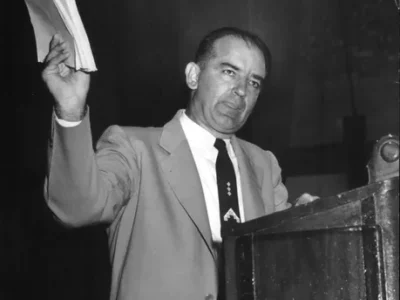Climate protester DeChristopher gets 2-year sentence
 Tim DeChristopher, the young man who bid on federal oil and gas leases as a form of protest against global warming, was sentenced yesterday to 2 years in prison, 3 additional years on probation, and a $10,000 fine. DeChristopher was convicted in March of placing false bids at a federal auction, after his attempt to assert a necessity defense was rejected.
Tim DeChristopher, the young man who bid on federal oil and gas leases as a form of protest against global warming, was sentenced yesterday to 2 years in prison, 3 additional years on probation, and a $10,000 fine. DeChristopher was convicted in March of placing false bids at a federal auction, after his attempt to assert a necessity defense was rejected.
There’s no question that DeChristopher was properly convicted. I explained earlier that the necessity defense is a long shot in climate protest cases in general, and especially so in this one, where the leasing decision was far removed from any greenhouse gas emissions. And those who practice civil disobedience should be prepared to take the consequences. But I continue to think, as I also explained earlier, that this was a good case for prosecutorial discretion in the direction of leniency. DeChristopher did violate the law, but he didn’t put any people at risk or cause widespread disruption of government or private activity, as other climate protesters have done. Mostly, he embarrassed the Department of Interior by showing how loosely they monitor these multi-million-dollar lease sales. It’s too bad the government can’t sufficiently take a reasonably harmless joke to at least have gone along with the probation officer’s recommendation of a lighter sentence. According to the Guardian, the U.S. sought to put DeChristopher away for 4.5 years, a sentence which in my view would have been out of all proportion to the seriousness of the offense.
Needless to say, reasonable minds can differ on this one. Brigham Daniels, at Environmental Law Prof Blog, opines that the sentence was warranted.
Reader Comments
3 Replies to “Climate protester DeChristopher gets 2-year sentence”
Comments are closed.







First, I appreciate the implied concession that I have a reasonable mind.
Second, I do not believe that what he did, however, was a joke. I think that it was a mistake–one that he probably would not have made upon some reflection.
I think that you are right that DeChristopher challenged DOI’s sense humility. I am not sure how he was advised, but strategically, he would have been much better off at numerous points in the road had he chosen not to try to invent himself into a martyr. He could have done it right after he was apprehended, the days following, before entering a plea, at the time of entering the plea, after the verdict, or anytime in between. At each point, he challenged the legitimacy of the agency and subsequently the legitimacy of the judge and his trial. I am guessing that he played it differently, he could have gotten away with a less strict sentence and perhaps even community service.
Given where DeChristopher pushed DOI and the court, I think that DeChristopher was lucky to get the sentence he got. I also think it was fair.
Regardless, whether he got what he deserved, however, in the end he got what he wanted–the status of a martyr.
In my view, he did more to harm the climate cause than help it. He ended up making himself into an extremist and a media hog. Given that environmentalists have science on their side and that he is crowding out others with more public credibility, his “movement” serves his own purposes but not much else.
Brigham —
Thanks for sharing your thoughts here. I respect your views, and I’m sure that you’ve had a lot more exposure to the media circus surrounding this case than I have. I agree with you that what DeChristopher did, both at the sale and afterwards, was ill-advised and poorly thought out. But I also think it should be the prosecutor’s (and for that matter the judge’s) role to be above injured pride and see that justice was done. I don’t think DeChristopher’s bids did much real damage to the U.S. To the extent there was actual damage, the U.S. itself could easily have prevented it by requiring some sort of credentials before it allowed people to bid. Auctioneers of low-value foreclosed condos around here do more to vet their bidders than the Department of Interior was in this case.
You make some good points, and I particularly like your line about foreclosed condos.